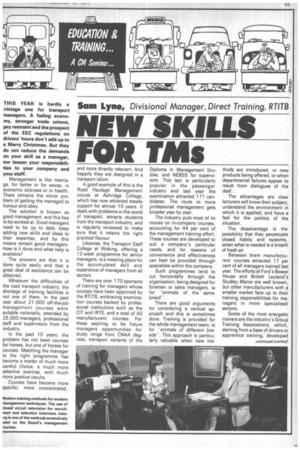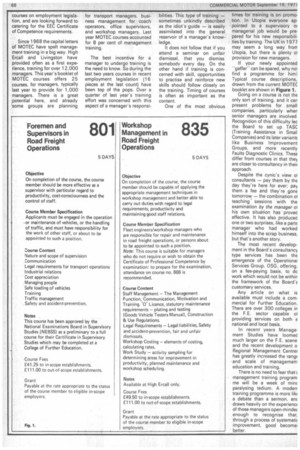Sam Lyne, Divisional Manager, Direct Training, RTITB
Page 71

Page 72

If you've noticed an error in this article please click here to report it so we can fix it.
MI SKILLS TMs
THIS YEAR is hardly a vintage one for transport managers. A fading econo my, stronger trade unions, 'pay restraint and the prospect of the EEC regulations on drivers' hours don't add up to a Merry Christmas. But they do not reduce the demands on your skill as a manager, nor lessen your responsibilities to your company and your staff.
Management is like marriage, for better or for worse, in economic sickness or in health. There remains the minor problem of getting the managed to honour and obey.
The solution is known as good management, and this has to be worked at. Good managers need to be up to date, keep adding new skills and ideas to their expertise, and by this means remain good managers. How is it done and what help is available?
The answers are that it is done quite easily and that a great deal of assistance can be obtained.
Whatever the difficulties of the road transport industry, the shortage of training facilities is not one of them. In the past year about 21,000 off-the-job management courses were avilable nationally, attended by 25,000 managers, professional staff and supenirsors from the industry.
In the past 10 years, the problem has not been courses for horses, but one of horses for courses. Matching the manager to the right programme has become a matter of much more careful choice, a much more selective exercise, with much more positive results.
Courses have become more specific, more concentrated, and more directly relevant. And happily they are designed in a transport idiom.
A good example of this is the Road Haulage Management course at Ashridge College, which has now attracted steady support for almost 10 years. It deals with problems in the world of transport, attracts students from the transport industry, and is regularly reviewed to make sure that it retains the right practical flavour.
Likewise, the Transport Staff College at Woking, offering a 12-week programme for senior managers, is a meeting place for the accumulated skill and experience of managers from all sectors.
There are over 170 sponsors of training for managers whose courses have been approved by the RI-1[B, embracing examination courses backed by professional institutions such as the CIT and IRTE, and a total of 40 manufacturers' courses. For these aspiring to be future managers opportunities for study range from CNAA degrees, transport variants of the
Diploma in Management Stu-. dies, and NEBSS for supervisors. This last is particularly popular in the passenger industry and last year the examination attracted 171 candidates. The route to more professional management gets broader year by year.
The industry puts most of its money on in-company courses, accounting for 44 per cent of the management training effort. These courses are developed to suit a company's particular needs, and for reasons of convenience and effectiveness can best be provided through specialists within the company.
Such programmes tend to cut horizontally through the organization, being designed for foremen or sales managers, ie for "animals of the same breed".
There are good arguments for considering a vertical approach and this is sometimes done. Training is provided for the whole management team, ie for "animals of different breeds". This approach is particularly valuable when new me
thods are introduced, or new products being offered, or when departmental failures appear to result from dialogues of the deaf.
The advantages are clear lecturers will know their subject, understand the environment in which it is applied, and have a feel for the politics of the situation.
The disadvantage is the possibility that they perpetuate closed habits and systems, when what is needed is a breath of fresh air Between them manufacturers' courses attracted 17 per cent of all managers trained last year. The efforts of Ford's Bower House and British Leyland's Studley Manor are well known, but other manufacturers with a smaller market face up to their training responsibilities for managers in more specialised sectors.
Some of the most energetic trainers are the industry's Group Training Associations, which, starting from a base of drivers or apprentice training, developed courses on employment legislation, and are looking forward to catering for the EEC Certificate of Competence requirements.
Since 1968 the capital letters of MOTEC have spelt management training in a big way. High Ercall and Livingston have provided often as a first experience, training for over 12,000 managers. This year's booklet of MOTEC courses offers 25 courses, for managers, typically last year to provide for 1,000 managers. There is a great .potential here, and already some groups are planning
for transport managers, business management for coach operators, office supervisors, and workshop managers. Last year MOTEC courses accounted for 8 per cent of management training.
The best incentive for a manager to undergo training is the need to know. So during the last two years courses in recent employment legislation (16 pieces at the last count) have been top of the pops. Over a quarter of last year's training effort was concerned with this aspect of a manager's responsi bilities. This type of training — sometimes unkindly described as the idiot's guide — is easily assimilated into the general reservoir of a manager's knowledge.
It does not follow that if you attend a seminar on unfair dismissal, that you dismiss somebody every day. On the other hand if training is concerned with skill, opportunities to practise and reinforce new skills should follow closely on the training. Timing of courses is often as important as the content.
One • of the most obvious
times for training is on promotion. In Utopia everyone appointed to a supervisory or managerial job would be prepared for his new responsibilities by training. The UK in 1977 may seem a long way from Utopia, but there is plenty ol provision for new managers.
If your newly appointed "gaffer" can be spared, why not find a programme for hirrf Typical course descriptions, drawn from the current MOTEC booklet are shown in Figure 1.
Going on a course is not the only sort of training, and it can present problems for small companies, particularly when senior managers are involved. Recognition of this difficulty lec the Board to set up TASC (Training Assistance in Small Companies) and its later variants like Business Improvement Groups, and more recently Faults Diagnostic Clinics. These differ from courses in that they are closer to consultancy in their approach.
Despite the cynic's view ol consultants — pay them by the day they're here for ever; pay them a fee and they're gone tomorrow — the combination 01 teaching sessions with the examination by the manager ol his own situation has proved effective. It has also produced one or two surprises, like a parts manager who had worked himself into the scrap business, but that's another story.
The most recent development in the Board's consultancy type services has been the emergence of the Operational Services Group, OSG, offering, on a fee-paying basis, to dc work which would not be within the framework of the Board's customary services.
Any article on • what is available must include a commercial for Further Education. There are over 300 colleges in the F.E. sector capable o1 providing services on both a national and local basis.
In recent years Management Studies have loomed much larger on the F.E. scene and the recent development o Regional Management Centret has greatly increased the rang( • and scale of management education and training.
There is no need to fear that management training program me will be a week of min( paralysing tedium. A moderr training programme is more like a debate than a sermon, an( draws heavily on the experience of those managers open-minde( enough to recognise that, through a process of systematic improvement, good become! better.
































































































































